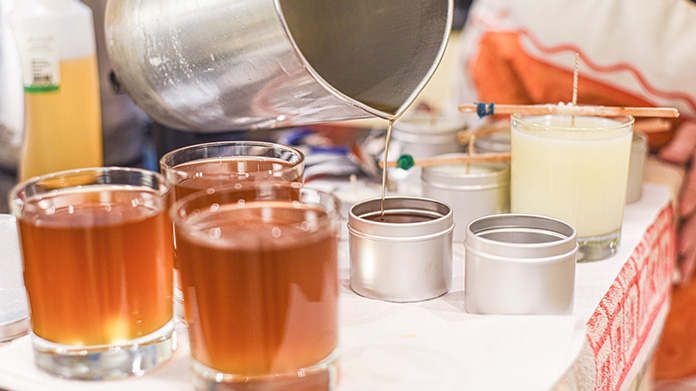Should I Start an LLC for My Candle Making Business?
Starting a limited liability company (LLC) for your candle making business can provide several benefits.
Most importantly, an LLC structure offers limited liability to its owners, which can protect their personal assets from lawsuits and creditors.
For a candle making business, lawsuits can arise from things like poorly-designed candles leading to an outbreak of a fire at a customer’s apartment complex or fraudulently misleading claims about your candles’ safety.
LLCs are also affordable, highly flexible (from a tax point-of-view), and can make your candle making business seem more credible.

Interested in getting started? More than 84% of our readers form their LLC through a specialized LLC formation service in order to save time and avoid potential penalties.

Do I Need an LLC for a Candle Making Business?
LLCs are a simple and inexpensive way to protect your personal assets and save money on taxes.
You should form an LLC when there’s any risk involved in your business and/or when your business could benefit from tax options and increased credibility.
LLC Benefits for a Candle making Business
Candle making often starts as a hobby before becoming a business. Once you are ready to scale and grow your candle making business, an LLC becomes significantly more important.
By starting an LLC for your candle making business, you can:
- Protect your savings, car, and house with limited liability protection
- Have more tax benefits and options
- Increase your business’s credibility
Limited Liability Protection
LLCs provide personal liability protection. This means your personal assets (e.g., car, house, bank account) are protected in the event your candle making business is sued or if it defaults on a debt.
Candle making businesses need liability protection because of the risk associated with the product. This can include personal injury caused by faulty glass or wicks, and/or property damage.
Example 1: A small fire breaks out in your business which spreads to the store next door. They ask for your business to cover their repair bills and since your status as an LLC permits you limited liability, your personal assets cannot be used to pay for the damages.
Example 2: As your business grows you take out a small business loan to help pay for expanding your workplace and unfortunately miss your payments and default. Being an LLC, your limited liability protects your personal assets.
Example 3: An irate customer is suing you, claiming that your candles are defective and caused significant fire damage to their home. Being an LLC, limited liability can protect your personal assets from being exposed in a lawsuit.
LLC Tax Benefits and Options for a Candle Making Business
LLCs, by default, are taxed as a pass-through entity, just like a sole proprietorship or partnership. This means that the business’s net income passes through to the owner’s individual tax return. The net income is then subject to income taxes (based on the owner’s tax bracket) and self-employment taxes.
Sole proprietorships and partnerships are taxed in a similar way to LLCs, but they do not offer limited liability protection or other tax options.
S Corp Option for LLCs
As your business grows, the S corp tax status might become a good tax option for your LLC.
If a candle making business owner believes they’ll be paying themselves a reasonable salary and at least $10,000 in distributions each year, they might benefit from another LLC tax option, the S corporation (S corp) tax status.
S corp tax status for an LLC can help reduce self-employment and overall tax burden under the right circumstances.
For questions about tax solutions for your candle making business, we recommend scheduling a free tax consultation.
Credibility and Consumer Trust
Candle making businesses rely on consumer trust. Credibility plays a key role in creating and maintaining any business.
Businesses that form LLCs gain a level of consumer trust and credibility simply by forming an LLC.
A growing business can also benefit from the credibility of an LLC when applying for small business loans, grants, and credit.
Launch Your LLC With Tailor Brands
More than 84% of our readers form their LLC through a specialized LLC formation service like Tailor Brands in order to save time and avoid potential penalties.
How to Form an LLC
Forming an LLC is easy. There are two options for forming your LLC:
- You can hire a professional LLC formation service to set up your LLC (for a small fee)
- Or, choose your state from the list below to start an LLC yourself
Select Your State
- Alabama LLC
- Alaska LLC
- Arizona LLC
- Arkansas LLC
- California LLC
- Colorado LLC
- Connecticut LLC
- Delaware LLC
- Florida LLC
- Georgia LLC
- Hawaii LLC
- Idaho LLC
- Illinois LLC
- Indiana LLC
- Iowa LLC
- Kansas LLC
- Kentucky LLC
- Louisiana LLC
- Maine LLC
- Maryland LLC
- Massachusetts LLC
- Michigan LLC
- Minnesota LLC
- Mississippi LLC
- Missouri LLC
- Montana LLC
- Nebraska LLC
- Nevada LLC
- New Hampshire LLC
- New Jersey LLC
- New Mexico LLC
- New York LLC
- North Carolina LLC
- North Dakota LLC
- Ohio LLC
- Oklahoma LLC
- Oregon LLC
- Pennsylvania LLC
- Rhode Island LLC
- South Carolina LLC
- South Dakota LLC
- Tennessee LLC
- Texas LLC
- Utah LLC
- Vermont LLC
- Virginia LLC
- Washington LLC
- Washington D.C. LLC
- West Virginia LLC
- Wisconsin LLC
- Wyoming LLC
For most new business owners, the best state to form an LLC is the state where you live and where you plan to conduct your business.
Do LLCs Need Insurance?
All businesses need insurance to protect their business assets — even LLCs. This is because limited liability protection from being an LLC protects your personal assets, not your business assets.
Insurance can help with the costs of replacing equipment or paying for damages, helping you get back to work sooner.
Common Situations Business Insurance May Cover for a Candle Making Business
Example 1: When hosting a candle party in a customer’s home, you forget about a candle that was lit. The candle burns down and eventually causes a fire that burns the customer’s kitchen. General liability insurance would likely cover the damage to the kitchen and its contents.
Example 2: When selling candles in-person at a craft show, a glass candle holder is dropped by a customer. The glass shatters and severely cuts the customer. Should they sue, general liability insurance would likely cover the customer’s injury.
Example 3: You accidentally post inaccurate information about a competitor in comments on social media, and the competitor seeks compensation for the damage you’ve caused to their reputation. General liability insurance would probably cover any legal fees or settlements associated with the incident.
Other Types of Coverage Candle Making Businesses Need
While general liability is the most important type of insurance to have, there are several other forms of coverage you should be aware of. Below are some other types of insurance all candle making businesses should obtain.
Product Liability Insurance
Selling candles exposes your business to potential risk long after transactions are completed, and product liability insurance helps protect against some of those risks. For example, a child might become sick after eating a candle, or a candle’s flame might cause a house fire. Even if your product isn’t at fault, affected customers might still file expensive lawsuits against the business. Product liability insurance often covers such risks and resulting lawsuits.
Product liability insurance may be purchased as a standalone insurance policy or through a package policy.
Commercial Property Insurance
Any workspace or storefront that your business has should probably be protected by commercial property insurance. Property insurance normally covers commercial facilities as well as the equipment kept in them.
If you run a home-based candle making business, there’s a good chance that you still need commercial property insurance for the workspace in your house. Most homeowner’s insurance policies won’t cover commercial workspaces, leaving a coverage gap if you don’t get commercial property insurance.
Commercial property insurance is frequently available as part of a business owner’s policy (BOP).
Commercial Auto Insurance
Vehicles that are used for commercial purposes often have to be insured with commercial auto insurance. Business-owned vehicles always need their own commercial auto policies. Personal vehicles that are used for both private and commercial driving might need commercial auto coverage depending on the particular situation.
If you use a personal vehicle to deliver candles, make sure it’s properly insured both when it’s driven for private use and when you’re driving for business reasons.
Commercial Umbrella Insurance
Umbrella coverage allows you to extend above and beyond the standard limits of your other business insurance policies. If you are faced with a large lawsuit or other claim situation, there’s a possibility that the coverage limits of your standard policies will be insufficient. In this case, your umbrella policy will allow you to surpass these limits.
Should I Start an LLC FAQ
The better business structure depends on your business’s unique circumstances and needs. However, unless your business is very low profit and very low risk, an LLC is likely the better option.
At a minimum, you will need general liability insurance.
Read our Candle Making Business Insurance article for more info.
Depending on local zoning laws, you will be able to start your business at home, using your own kitchen heat source and utensils. Your candle ingredients shouldn’t cost more than a couple hundred dollars to start.
Once you’ve started small and proven your business model will work, you can buy ingredients and products at lower per-unit costs in bulk.
Visit our How to Start a Candle Making Business guide to learn more.
Some of the main operating expenses for a candle making business are supplies and insurance.
Candle making businesses make money by selling candles, either directly to customers or retailers.


